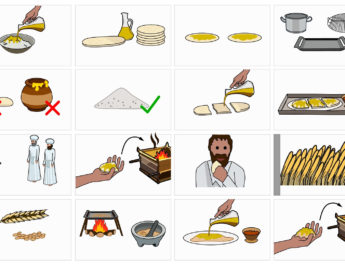Psalm 119:137-144
Ordinary C49
137 You are righteous,A O Lord,B
and your judgmentsC are right.D
A “righteous” = tsaddiq. From the same as tsedeq (rightness, righteousness, just cause, vindication; that which is right in a natural, moral, or legal sense; abstractly equity; figuratively prosperity). This is just, innocent, righteous, righteous one, or lawful.
B “Lord” = YHVH. From havah (to be, become) or hayah (to come to pass, become, be). This is the name of the God of Israel, the self-existent and eternal one, the tetragrammaton. This pronunciation has been lost to time so “Lord” is generally used in its place.
C “judgments” = mishpat. From shaphat (to judge, defend, pronounce judgment, condemn, govern). This is a verdict or formal sentence whether from humans or from God. It includes the act of judging as well as the place that judging takes place, the suit itself, and the penalty. Abstractly, this is justice, which includes the rights of the participants.
D “right” = yashar. From yashar (to be straight, right, even, smooth, or agreeable; figuratively, to make something pleasant or prosperous). This is straight, right, level. Also, it is pleasing, whether pleasing God or pleasing other people. So, it is upright or righteous.
138 You have appointedE your decreesF in righteousnessG
and in allH faithfulness.I
E “appointed” = tsavah. This is to charge, command, order, appoint, or enjoin. This is the root that the Hebrew word for “commandment” comes from (mitsvah).
F “decrees” = edah. From ed (witness, testimony, recorder); from ud (to admonish, repeat, duplicate, testify, restore, record, relieve). This is testimony or witness.
G “righteousness” = tsedeq. Related to “righteous” in v137. See note A above.
H “all” = meod. Perhaps from the same as uwd (firebrand, a poker). This is very, greatly, exceedingly. It can also mean vehemence, force, abundance.
I “faithfulness” = emunah. From aman (to believe, endure, fulfill, confirm, support, be faithful, put one’s trust in, be steadfast. Figuratively, this is to be firm, steadfast, or faithful, trusting, believing, being permanent, morally solid). This word is literally firmness, but figuratively fidelity, faithfulness, honesty, responsibility, trust, truth, steadfastness. This word shares a root with the word “Amen.”
139 My zealJ consumesK me
because my foesL forgetM your words.N
J “zeal” = qinah. Perhaps from qana (to be jealous, zealous, envious). This is zeal, jealousy, envy, anger, passion rivalry.
K “consumes” = tsamath. 15x in OT. This is to destroy, cut off, silence, or vanish. It is to put an end to in a literal or figurative sense.
L “foes” = tsar. From tsarar (to bind, restrict, narrow, be cramped, an adversary). Properly, this is a narrow or constricted place. Figuratively, it can be trouble, a pebble, an enemy, anguish, or distress.
M “forget” = shakach. This is to forget because of not remembering something or not paying attention to it. It can also mean to mislay.
N “words” = dabar. From dabar (to speak, declare, discuss). This is speech, a word, a matter, an affair, charge, command, message, promise, purpose, report, request. It is a word, which implies things that are spoken of in a wide sense.
140 Your promiseO is wellP tried,Q
and your servantR lovesS it.
O “promise” = imrah. From emer (speech, thing, utterance, promise, argument, command); from amar (to speak, say, answer, command, promise, report). This is any kind of utterance, a word or commandment.
P “well” = meod. Same as “all” in v138. See note H above.
Q “tried” = tsaraph. This is to refine, smalt, or fuse metal. It can also refer to the smelter (goldsmith or silversmith). Figuratively, this is refine in a literal or figurative sense – to test or try, make pure.
R “servant” = ebed. From abad (to work, serve, compel; any kind of work; used causatively, can mean to enslave or keep in bondage). This is a servant, slave, or bondservant.
S “loves” = aheb. This is to love, beloved, friend. It is to have affection for sexually or otherwise.
141 I am smallT and despised,U
yet I do not forget your precepts.V
T “small” = tsair. From tsaar (to be brought low, small, little one; figuratively, be insignificant or ignoble). This is little, young, least, younger, few in number, low in value.
U “am…despised” = bazah. This is to despise, hold in contempt, disesteem, or a person who is vile.
V “precepts” = piqqud. From paqad (to attend to or visit – can be used for a friendly or violent encounter; to oversee, care for, avenge, or charge). This is something that is appointed or decreed by God. It can refer to the Law as a whole or a commandment individually.
142 Your righteousnessW is an everlastingX righteousness,Y
and your lawZ is the truth.AA
W “righteousness” = tsedaqah. Related to “righteous” in v137 & “righteousness” in v138. From the same as tsedeq (see note A above). This is righteousness, justice, righteous acts, and moral virtue.
X “everlasting” = olam. This is a long scope of time whether in the past (antiquity, ancient time) or in the future (eternal, everlasting).
Y “righteousness” = tsedeq. Same as “righteousness” in v138. See note G above.
Z “law” = torah. From yarah (to throw, shoot, be stunned; to flow as water so figuratively to instruct or teach). This is law, instruction, teaching, or statute. It can also refer to the first five books of the Bible – the Torah.
AA “truth” = emet. Related to “faithfulness” in v138. From aman (see note I above). This is firmness or stability. Figuratively, it is faithfulness, truth, or trustworthiness. This is the same root that “amen” comes from.
143 TroubleBB and anguishCC have come uponDD me,
but your commandmentsEE are my delight.FF
BB “trouble” = tsar. Same as “foes” in v139. See note L above.
CC “anguish” = matsoq. 6x in OT. From tsuq (to press on, compress; figuratively, to oppress or bring distress). This is literally a narrow place. Figuratively, it is anguish, distress, or confinement.
DD “come upon” = matsa. This is to find, catch or acquire. It can also mean to come forth or appear. Figuratively, this can mean to meet or be together with.
EE “commandments” = mitsvah. Related to “appointed” in v138. From tsavah (see note E above). This is a commandment, law, ordinance obligation, or tradition. It is something commanded whether by God or by a human authority. This term is sometimes used collectively to refer to the Law.
FF “delight” = shaashuim. 9x in OT. From shaa (to delight, play) OR form sha’a’ (to stare, cry out, amuse self, be blinded, play). This is a delight, pleasure, or enjoyment.
144 Your decreesGG are righteousHH forever;II
give me understandingJJ that I may live.KK
GG “decrees” = eduth. Related to “decrees” in v138. From ed (see note F above). This is testimony, ordinance, decree, warning, or witness.
HH “righteous” = tsedeq. Same as “righteousness” in v138. See note G above.
II “forever” = olam. Same as “everlasting” in v142. See note X above.
JJ “give…understanding” = bin. This is to discern, consider, attend to. It refers to distinguishing things in one’s mind or, more generally, to understand.
KK “live” = chayah. This is to live or keep alive in a literal or figurative sense. So, it can be revive, nourish, or save.
Image credit: “The heart can think of no devotion Greater than being shore to the ocean, Holding the curve of one position, Counting an endless repetition.” by Nick Kenrick, 2015.




